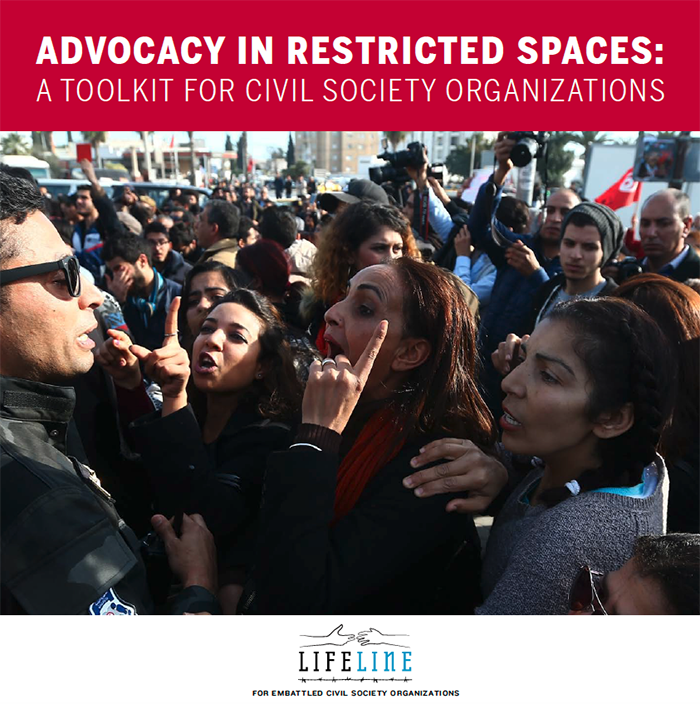

Advocacy in Restricted Spaces: A Toolkit for Civil Society
The Advocacy in Restricted Spaces toolkit is a practical resource that emphasizes that advocacy is possible even in highly restrictive contexts.
Created by the Lifeline Embattled CSO Assistance Fund, a consortium led by Freedom House, the Advocacy in Restricted Spaces toolkit is intended for use by grassroots, national, and regional civil society organizations that want to engage in advocacy in restrictive environments. The toolkit includes concrete examples and new perspectives on mobilizing around opportunities for change.

While many advocacy resources are oriented toward groups operating in functioning democracies where basic freedoms are respected, the Advocacy in Restrictive Spaces toolkit provides real-world examples of how civil society can be effective even under significant duress.
Thousands of civil society organizations around the world find themselves operating in a "restrictive" environment, where the ability of organizations to freely assemble, associate, and express themselves is significantly limited. As these organizations face myriad challenges ranging from repressive legislation to direct physical attacks from police or criminal gangs, this toolkit places the advocacy planning process within the context of risk assessment and mitigation.
In the era of COVID-19 restrictions, the tactics and case studies included in the Toolkit are perhaps even more relevant, as growing numbers of civil society organizations find themselves operating in increasingly restrictive space where traditional advocacy tactics may no longer be feasible. The toolkit can help organizations take a new look at their operating environment and see what opportunities for advocacy still exist.

The toolkit includes:
- A step-by-step guide for advocacy planning that stresses risk mitigation and intersectionality.
- 10 tactics that can be used in restrictive spaces, such as Engaging with Unlikely Allies; Addressing Slander, Stereotypes, and Stigmatization; and Creative Cultural Resistance.
- 16 case studies with real-world examples of how civil society organizations achieved success with their advocacy
- Represents geographic diversity with case studies from Russia, Syria, Democratic Republic of Congo, China, Mali, Cambodia, Armenia, Hungary, Egypt, Brazil, Kenya, Turkey, and Uganda.
- Highlights how traditionally marginalized groups have engaged in advocacy, including women’s rights activists, LGBTI communities, and ethnic minorities.
- Demonstrates how the CSO set a targeted goal, strategy, and tactics for its advocacy campaign, in addition to impact achieved.
- Links to more than 50 external resources related to advocacy planning and security.
- Annexes related to digital security, well-being, risk assessment, and stakeholder mapping to enable civil society organizations to prevent and mitigate threats at each stage of their campaigning.
Available Languages:
About Lifeline:
The Lifeline Fund for Embattled CSOs provides emergency financial assistance to civil society organizations (CSOs) under threat or attack, as well as rapid response advocacy and resiliency grants to support CSOs in responding to broader threats against civic space. Founded in 2011, Lifeline is a consortium of 7 international non-governmental organizations supported by 19 governments that aims to push back against civic space threats. The Lifeline consortium is led by Freedom House and consists of Front Line Defenders, CIVICUS, International Center for Not-For-Profit Law (ICNL), People in Need (PIN), FORUM-ASIA, and Swedish International Liberal Center (SILC). Since its founding, Lifeline has provided grants to 2,222 at-risk civil society organizations (CSOs) in 115 countries.

Sign up to receive the Freedom House weekly newsletter.